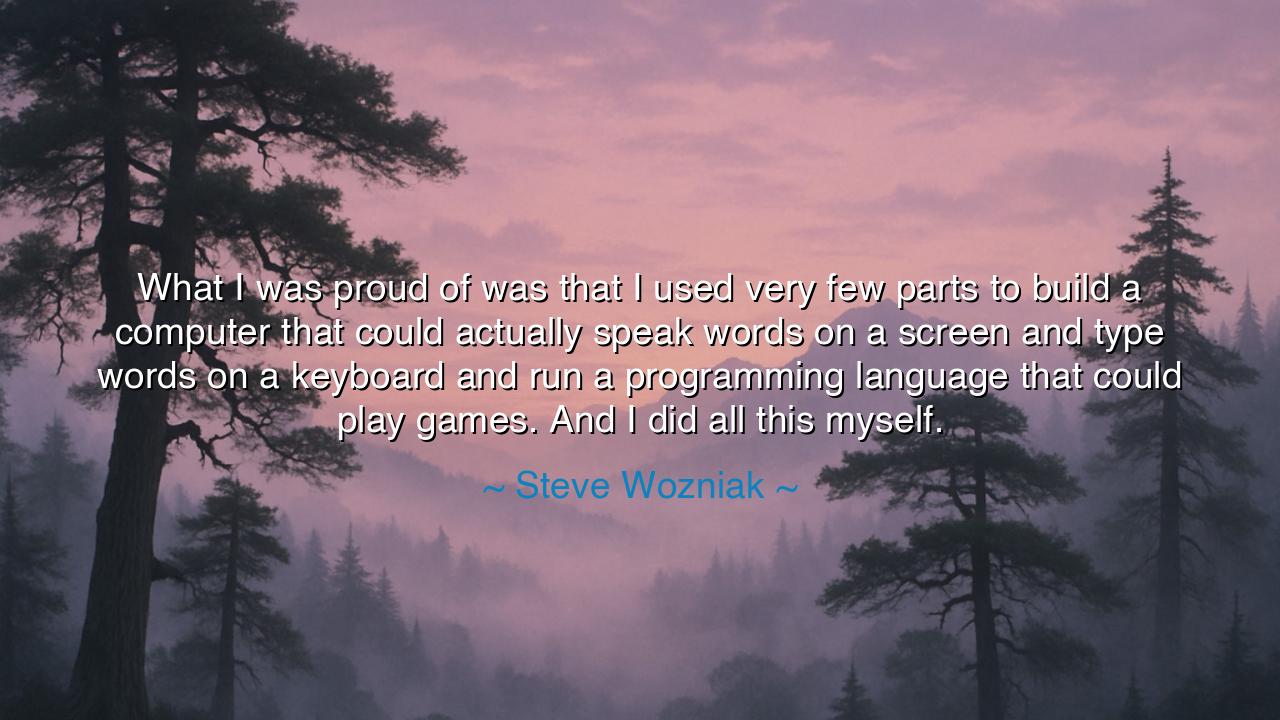
What I was proud of was that I used very few parts to build a
What I was proud of was that I used very few parts to build a computer that could actually speak words on a screen and type words on a keyboard and run a programming language that could play games. And I did all this myself.






In the realm of invention and creation, there are those who rely on vast resources and the labor of many hands to shape the future, and there are those like Steve Wozniak, who, with nothing more than his ingenuity and a handful of humble tools, forged something monumental. His words, spoken with the humility of a true innovator, ring out across the ages: “What I was proud of was that I used very few parts to build a computer that could actually speak words on a screen and type words on a keyboard and run a programming language that could play games. And I did all this myself.” Here, within this declaration, lies the essence of creativity and resourcefulness, qualities that have long been revered as the bedrock of progress.
Wozniak's pride was not in the abundance of resources at his disposal, but in the mastery of using what little he had. He understood that greatness does not come from wealth, nor from the accumulation of materials, but from the mind's ability to see possibilities where others see limitations. The power of his work lay not in its complexity but in its simplicity—a simple computer that could speak, type, and even play games with only the most essential parts. In an age where computing power was often measured by the number of components and the complexity of design, Wozniak dared to defy this notion, proving that the power of creation lies in vision, not in sheer scale.
The humility with which he spoke of this achievement speaks to a larger truth about the human spirit: that even the most extraordinary feats are possible through determination and a refusal to be shackled by the conventional. Like Leonardo da Vinci, who crafted magnificent works of art and science from his own restless curiosity and meticulous hands, Wozniak too exemplifies the truth that the greatest creations often emerge from the simplest acts of ingenuity. His invention—the Apple I—was not just a machine; it was a manifestation of the human mind's boundless capacity to shape the world, not by what it possesses, but by how it perceives the world around it.
In the great stories of old, heroes often succeeded not through superior numbers or tools, but through their ability to see beyond the ordinary. David, with only a sling and a stone, struck down the mighty Goliath. Wozniak, too, faced the monumental task of building something that could change the world with limited resources. In his case, the tools were few, but his vision was boundless. He understood the deeper wisdom that it is not the materials that make greatness, but the spirit of the creator.
The legacy of this moment transcends the personal triumph of a single man. It speaks to the collective potential that resides within each of us—the belief that through creative thinking, effort, and a willingness to embrace the challenge of doing things differently, we too can reshape the world. Innovation, Wozniak teaches us, does not always require the most advanced technology or the greatest resources. What it requires is vision, perseverance, and the courage to act with what we have.
So, in the quiet corners of our own lives, when faced with the overwhelming complexity of our world and the many obstacles before us, let us remember the lesson of Wozniak’s humble creation. When he speaks of building something powerful with few parts, he reminds us that simplicity is often the most direct path to greatness. His story challenges us to think not of what we lack, but of what we can create from the resources at hand, and how our determination can turn the seemingly insignificant into something that speaks, types, and even plays in ways that leave the world in awe.
Lesson for the ages:
Let us take Wozniak’s example to heart. The next time you face a challenge, do not measure your success by the materials you have or the tools at your disposal. Instead, measure your success by the clarity of your vision, the strength of your will, and the simplicity with which you bring your ideas to life. In the end, it is not the complexity of the creation that matters, but the creativity and determination that birthed it.
Practical Action:
In your own work, when confronted with a difficult task, focus on reducing complexity. Look at what you have and use those few resources with clarity and focus. You may find that simplicity, not excess, is the true key to creating something extraordinary. Like Wozniak, trust that the fewest parts can lead to the greatest triumphs.






AAdministratorAdministrator
Welcome, honored guests. Please leave a comment, we will respond soon